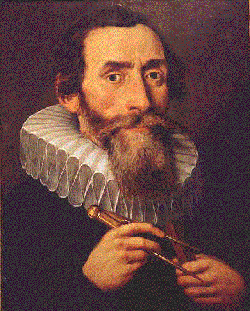"The diversity of the phenomena of nature is so great, and the treasures hidden in the heavens so rich, precisely in order that the human mind shall never be lacking in fresh nourishment."
 Johannes Kepler-NASA; Kepler, kepler.nasa.gov/Mission/JohannesKepler/
Johannes Kepler-NASA; Kepler, kepler.nasa.gov/Mission/JohannesKepler/
For years, man has admired the stars and questioned what do they mean. Ever since the dawn of the human race, we have thought, and thought, of our meaning in a world beyond comprehension. In the late 16th century, a man named Johannes Kepler was born into the world, and he helped change our thinking of the vast and seemingly endless universe. Here is his story.
Johannes Kepler was born on December 27, 1571, in Wiel, Swabia, Germany. He is well known for his contribution to astrophysics, and more specifically, planetary motion. He also was a very religious man and looked to God on many of his works. His childhood was difficult. When he was a toddler, he contracted smallpox, and his vision was somewhat disabled. His education didn’t go well either, as it took him twice as long to pass Latin school than most other children. Overall, he had a relatively difficult life as a child, but that did change later on.
Kepler graduated from the University of Tuebingen studying mainly philosophy and theology, but also mathematics and astronomy. He had a much better education than from his childhood, which helped him become interested in many subjects of modern day sciences. In astronomy, at the time, the Ptolemaic theory was taught (which was that the Earth was the center of the universe and that all other celestial bodies orbited around it). But his personal opinion was much different at the time. He looked to the least popular theory of the day, which was the Copernicus theory (that the earth orbits around the sun, along with other celestial bodies). The Copernicus theory wasn’t very popular at the age, much like when people believed that the earth was flat. Yet, Kepler followed this theory and used it to base much of his research. In a university debate, Kepler even defended Copernicus and his research. His actions and beliefs cost him a chance at the Tuebingen faculty when he graduated.
Luckily, Kepler was offered a position as an astronomer in Graz, Styria, which is now a city in modern Austria. He took up this position in 1594. This occupation required him to help make astrological predictions, along with other mathematics. In his new career, he was well respected, and it helped him get a boost into his new profession, as an astronomer. Four years later, Kepler met another mathematician, named Tycho Brahe, in Prague. Tycho was a very secretive man, who kept much of his life separate from Kepler, and they did not get along well with each other. Although, working together did increase their friendship, it also helped them improve their occupational habits. Soon before he met Brahe and started working with him, Kepler stated this regarding his soon-to-be partner, "My opinion of Tycho is this: he is superlatively rich, but he knows not how to make proper use of it, as is the case with most rich people. Therefore, one must try to wrest his riches from him." Kepler's work with Brahe consisted of diagrams of the solar system, positions of planets, and the orbits of planets. Kepler was particularly interested in the orbit of Mars, and spent large amounts of times studying the skies. His research helped us understand a lot more of planetary motion and where other celestial bodies lie in the known universe.
Kepler's work really changed the way we view the universe today. He took the information that many thought was impossible, and changed it into fact. Kepler is a hero because of what he did in his life for science and astronomy. His heroics have been noticed by many, including Isaac Newton, who referred to Kepler's work on his writing of the laws of gravity. In Prague, a statue of Kepler and Tycho Brahe stands tall for their works and contributions to science. Also, in 2007, the space telescope "Kepler" was sent into orbit around earth, and has helped discover various exoplanets, which is now being looked through very carefully by the top scientists of our age. Kepler is a hero, a model, and one of the greatest scientists of all history.
Page created on 6/21/2012 12:00:00 AM
Last edited 10/28/2024 12:48:24 PM
